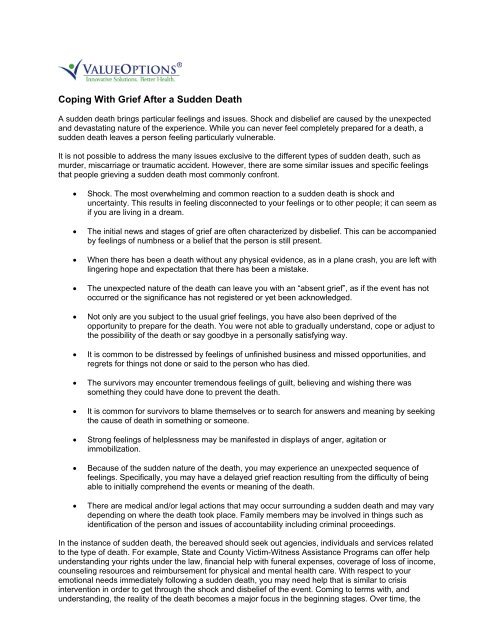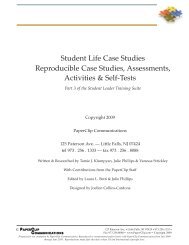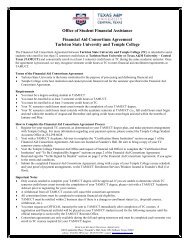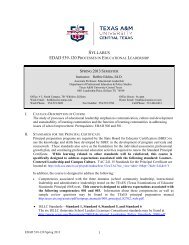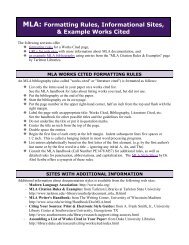Coping With Grief After a Sudden Death
Coping With Grief After a Sudden Death
Coping With Grief After a Sudden Death
- No tags were found...
You also want an ePaper? Increase the reach of your titles
YUMPU automatically turns print PDFs into web optimized ePapers that Google loves.
<strong>Coping</strong> <strong>With</strong> <strong>Grief</strong> <strong>After</strong> a <strong>Sudden</strong> <strong>Death</strong>A sudden death brings particular feelings and issues. Shock and disbelief are caused by the unexpectedand devastating nature of the experience. While you can never feel completely prepared for a death, asudden death leaves a person feeling particularly vulnerable.It is not possible to address the many issues exclusive to the different types of sudden death, such asmurder, miscarriage or traumatic accident. However, there are some similar issues and specific feelingsthat people grieving a sudden death most commonly confront.• Shock. The most overwhelming and common reaction to a sudden death is shock anduncertainty. This results in feeling disconnected to your feelings or to other people; it can seem asif you are living in a dream.• The initial news and stages of grief are often characterized by disbelief. This can be accompaniedby feelings of numbness or a belief that the person is still present.• When there has been a death without any physical evidence, as in a plane crash, you are left withlingering hope and expectation that there has been a mistake.• The unexpected nature of the death can leave you with an “absent grief”, as if the event has notoccurred or the significance has not registered or yet been acknowledged.• Not only are you subject to the usual grief feelings, you have also been deprived of theopportunity to prepare for the death. You were not able to gradually understand, cope or adjust tothe possibility of the death or say goodbye in a personally satisfying way.• It is common to be distressed by feelings of unfinished business and missed opportunities, andregrets for things not done or said to the person who has died.• The survivors may encounter tremendous feelings of guilt, believing and wishing there wassomething they could have done to prevent the death.• It is common for survivors to blame themselves or to search for answers and meaning by seekingthe cause of death in something or someone.• Strong feelings of helplessness may be manifested in displays of anger, agitation orimmobilization.• Because of the sudden nature of the death, you may experience an unexpected sequence offeelings. Specifically, you may have a delayed grief reaction resulting from the difficulty of beingable to initially comprehend the events or meaning of the death.• There are medical and/or legal actions that may occur surrounding a sudden death and may varydepending on where the death took place. Family members may be involved in things such asidentification of the person and issues of accountability including criminal proceedings.In the instance of sudden death, the bereaved should seek out agencies, individuals and services relatedto the type of death. For example, State and County Victim-Witness Assistance Programs can offer helpunderstanding your rights under the law, financial help with funeral expenses, coverage of loss of income,counseling resources and reimbursement for physical and mental health care. <strong>With</strong> respect to youremotional needs immediately following a sudden death, you may need help that is similar to crisisintervention in order to get through the shock and disbelief of the event. Coming to terms with, andunderstanding, the reality of the death becomes a major focus in the beginning stages. Over time, the
ereaved deal with issues and feelings comparable to other death experiences. If engaging in activitiesrelated to the deceased or disturbing thoughts about the manner of the death occur, speaking with aprofessional can be helpful.<strong>Coping</strong> tips• Consider sharing your thoughts and feelings with others who have experienced a similar loss.• Pay close attention to, and get help for, any changes in physical and emotional health as theymay be related to the loss.• Talk to professionals, family and friends to help gain perspective about the death and decreasefeelings of guilt.• Become educated about the cause of death.• Accept rather than deny your feelings, even unpleasant ones such as anger.• Be active in making choices about engaging in activities and rituals.ResourcesValueOptions® Behavioral Healthcare Services(800) 700-8646Behavioral Health Appointment Assistance(877) 298-3514TRICARE Assistance Program (TRIAP): A video Web-based counseling servicehttp://www.humana-military.com/south/bene/health-wellness/triap.aspHumana Military Healthcare Serviceshttp://www.humana-military.com/south/bene/beneficiary.asp(800) 444-5445By Robin F. Goodman, PhD, ATR-BC© 2000-2009 Lifescape


